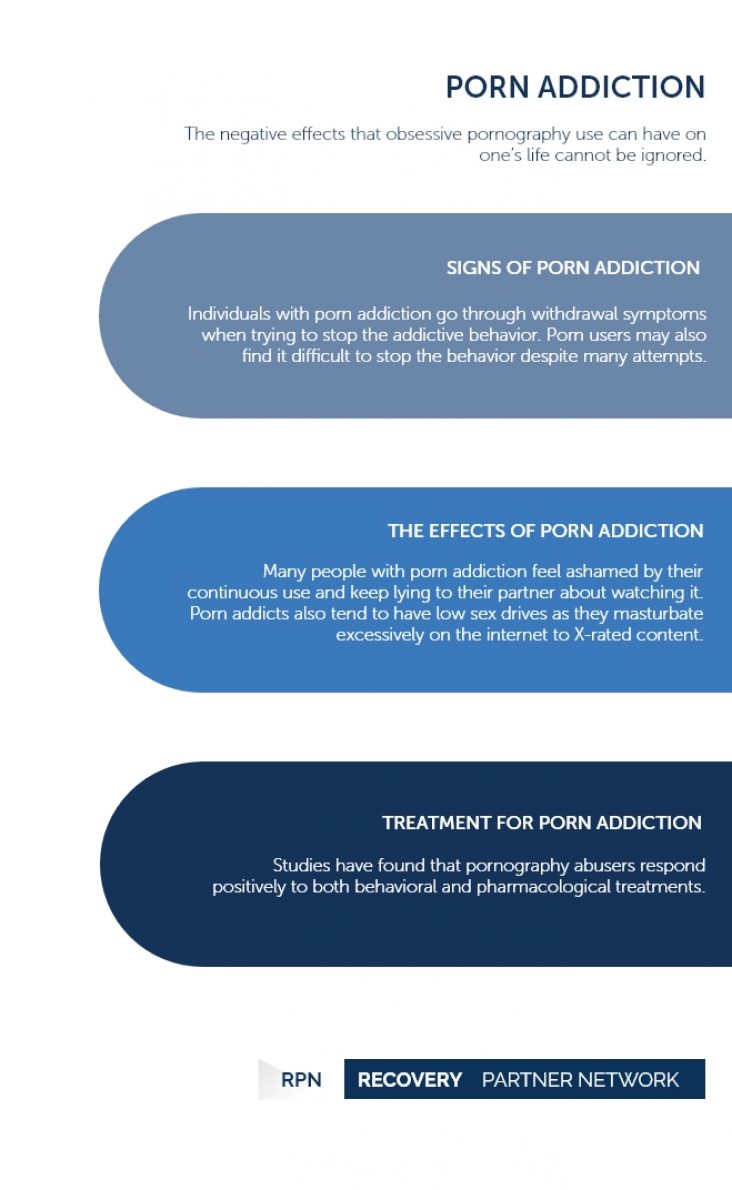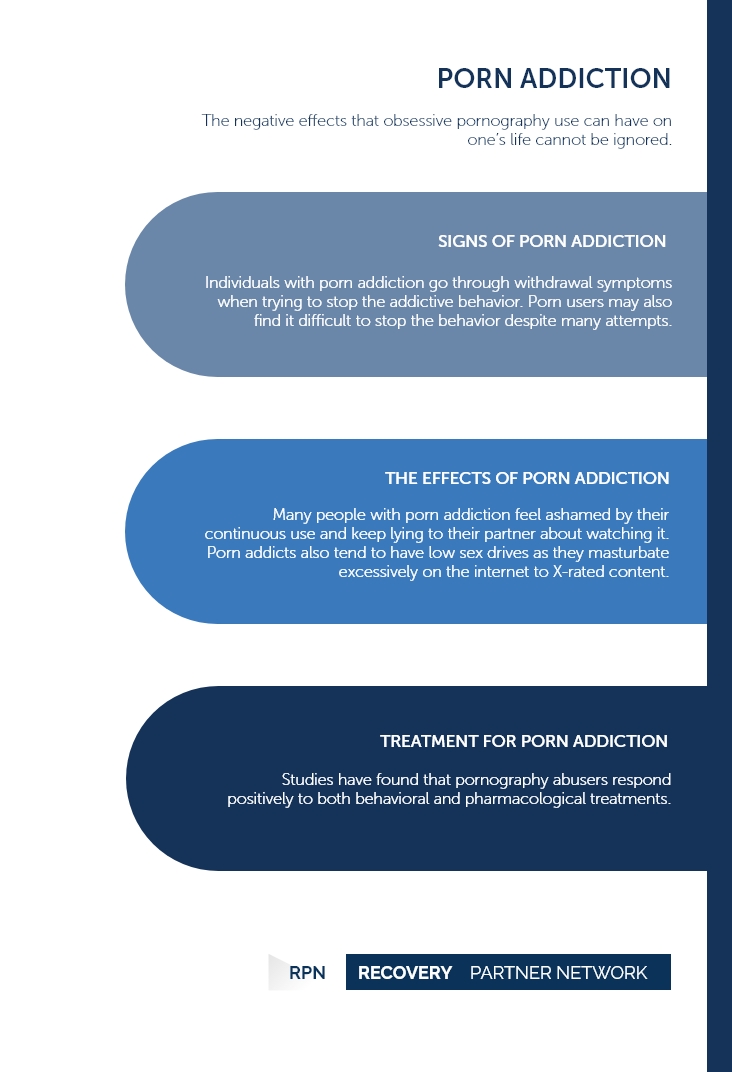The negative effects that obsessive pornography use can have on one ‘s life cannot be ignored.
Porn Addiction
Pornography addiction | Table of Contents
Porn Addiction Explained
The question of whether porn addiction is a real addiction is a sensitive topic. Porn addiction is considered by some to be a behavioral condition marked by an obsessive compulsion to watch pornographic content.
Many individuals become so fascinated with dirty thoughts and behaviors that they equate their urge to watch pornography just as a nicotine user who wants a cigarette. Professional therapy facilities and in-patient facilities are loaded with men and women that have lost all control of their sexual practices and are recognized as struggling with porn addiction. Many critics of the disorder cite the fact that the Diagnostic Statistical Manual for Psychiatric Disorders (DSM-V) of the American Psychiatric Association does not include sexual addiction problems as an illness. Still, it is worth noting that the American Society of Addiction Medicine does accept porn addiction as a behavioral addiction.
Pornographic addiction can severely harm relationships and take priority over somebody’s vital functions and responsibilities. If you’re addicted to porn, the behavior will be obsessive. What separates a porn addiction from a keen interest in porn is the negative consequences of your behavior. As a result of porn addiction, you waste an excessive amount of time watching porn, rather than engaging with others or taking care of your responsibilities. It is a behavior that persists, even at the risk of affecting one’s employment, relationships, or wellbeing.
FAQ
Addiction to porn involves the compulsive overuse of pornographic materials. Individuals who are addicted to porn are unable to stop their compulsion despite the negative consequences.
The repeated exposure to powerful images, such as porn, creates a compulsive craving in certain individuals to see such images over and over again. This craving contributes to patterns of compulsive behavior that can be impossible to break free of.
Is Watching Porn Healthy?
That’s a debatable topic–there’s no direct answer. Many people, researchers, and groups may claim that viewing porn to just about any degree would impact one’s life negatively. Nonetheless, some would argue that porn should be consumed in safe dosages and varieties.
What Causes Porn Addiction?
Porn addiction, much like other substances or “things“ that people can become addicted to, can be understood through principles of “operant conditioning.“
This is how behavior in this case watching porn is “supported,” or rewarded, which in turn makes you continue to want to do it.
Many different things can be validated and thus affect our behavior, but porn can be exceptionally motivating as the reward taps into a very simple innate urge–sex. Hence, getting addicted to porn is quite easy –it’s accessing a basic (and quite pleasurable) biological inclination. They are a lot easier to get hold of than going out and finding a “friend” to satisfy this urge.
The issue starts when sexual pleasure-seeking becomes repetitive, reckless, or at the detriment of other important aspects of your life. We could then presume that one seems to have a porn addiction.
Factors Influencing Porn Addiction
You might have a genetic susceptibility to impulsive behavior, dysregulation of impulses, or behavior that searches for sensations. You may have a predisposition to other symptoms related to sexual addiction, such as anxiety or depression.
As you could imagine, libido can be affected by higher levels of sex hormones like testosterone or estrogen.
You may be more likely to engage in excessive or compulsive porn viewing if you are prone to impulsive behavior and have high levels of sex–related hormones.
Early-life external conditions, like adverse events such as abuse or explicit content exposure, may lead to some of the attributes of porn addiction tendencies.
Mental health:
- Anxiety.
- Depression.
- Personality disorders.
- Poor impulse control.
- Performance anxiety.
- Certain mental health issues could make a significant contribution to behaviors related to porn addiction.
Social
Rejection in relationships and social groups may lead to other ways of finding sexual gratification that is less healthy.
Social isolation:
Social isolation not only increases one ‘s likelihood of seeking inappropriate ways to be sexually gratified, but it also leads to a host of other issues–such as depression and physical illnesses–that can contribute to porn addiction or unhealthy sexual behaviors.
Peer influence:
If somebody else around you does something, you are more inclined to do it, too. For example, having a friend, or a group of friends engaging in excessive porn–viewing can affect your behavior.
Signs of Porn Addiction
In a 2014 study conducted by the University of Cambridge, researchers discovered that the same reward centers of the brain as those of drug or alcohol addicts were activated in the brain scans of 19 different chronic porn addicts watching pornography. Likewise, several people who are addicted to porn who tried to stop, went through similar withdrawal symptoms that opioid addicts and alcoholics suffer as well. The Kinsley Institute Survey found that 9 percent of porn users attempted to stop but were unsuccessful.
Common Symptoms of Substance Addiction are:
- Chronic behavior, which results in loss of control.
- Failed attempts to stop given potential negative consequences.
- Continuously indulging in the behavior.
- The growing need for more.
- Developing tolerance.
- Withdrawal symptoms.
All of these symptoms are also experienced by those addicted to pornography, and the warning signs of porn addiction resemble those of drug use disorders as well.
Common Symptoms of Porn Addiction Include:
- Spending a lot of time looking at porn.
- No longer being able to stop using porn or porn-related behaviors, given repeated efforts to do so.
- Cravings to see porn.
- Becoming annoyed or aggressive when asked to stop using porn.
- Requiring increased amounts or more explicit porn to achieve the same level of satisfaction.
- Getting bored with one’s partner.
- Giving up social activities to use porn.
- Maintaining all or part of one’s porn use private from family members.
Pornography Statistics
- Forty million adults in the U.S. access porn websites regularly.
- 1 in 5 online searches on mobile phones is for pornographic content.
- People who are happily married are 61% less inclined to look at porn.
- 20% of people acknowledge that they watch porn at work.
- Eighty-eight percent of porn scenes are physically aggressive. Forty-nine percent of them are comprised of verbal aggression.
The Effects of Porn Addiction
The damage that addiction to pornography can do to a relationship can be huge. Many people with porn addiction feel ashamed by their continuous use and keep lying to their partner about watching it and lying about their whereabouts or activities so they can continue watching it. Additionally, many due to addiction to porn have low sex drives as they masturbate excessively on the internet to X-rated content, to the point that the actual participation in intercourse is low.
Many people who perceive the use of porn by their partner as a problem experience lower self-esteem, poor relationship quality, and lower sexual pleasure. Those who are addicted to porn realize that their obsessive use of pornography is detrimental to their relationship and damaging to their partner, and yet, they are still unable to refrain.
Relationships are not the only aspect of one’s life, which can be harmed by excessive usage of pornography. Psychologists state that patients report job losses because they were unable to control the urge to browse adult websites at work. Researchers found in a 2013 Forbes article that 25 percent of working adults reported gazing at pornography on an office screen. If left untreated, addiction to porn may lead to broken marriages, loss of self-esteem, feelings of shame, work or school issues, and financial problems.
Porn Addiction in Teenagers
Porn addiction is becoming an increasing concern among teenagers because of the accessibility of sexually explicit material on the internet. They can expose themselves to endless pages of adult content with the click of a button.
FAQ
Stay calm and have an open and honest converstaion with your child. Educate your child about the unrealistic nature of porn and explain clearly why it is problamatic.
Porn Statistics in Teens
- 9/10 boys are subjected to some type of pornography before they are 18 years old.
- There are 6/10 girls exposed to pornography before the age of 18.
- A male’s first exposure to pornography, on average, is at age 12.
- Teenage boys aged 12-17 are at the greatest risk of developing a porn addiction.
Viewing pornography can have negative effects on teenagers down the line, affecting both their physical and psychological well-being.
These consequences cover:
- Increase in dangerous behavior.
- A skewed worldview.
- Reducing capacity to build healthy relationships.
- Normalization of sexual violence.
- It greatly increased violence towards women.
Research reveals that teens subjected to sexually explicit sites are more prone to be promiscuous and more prone to have used alcohol or other intoxicating drugs during sexual encounters. This puts them at an increased risk of developing substance abuse or mental health disorder.
Treatment for Porn Addiction
Like all behavioral addiction treatment plans, therapy for porn addiction has to resolve and change the behavioral patterns and feelings that lead to addiction. Studies have found that pornography abusers respond positively to both behavioral and pharmacological treatments. Cognitive Behavioral Therapy (CBT) can help those who struggle with porn addiction to change their habits effectively and address any emotionally underlying issues that may contribute to addiction. Support groups and 12-step programs like Sex Addicts Anonymous have proven to be particularly helpful in determining potential triggers and maintaining sobriety when recovering from pornography.
In certain cases, mental health disorders such as depression, anxiety, obsessive–compulsive disorder (OCD), and post–traumatic stress disorder (PTSD) are linked with pornography and other sexual addictions. Recovery for porn addiction may, therefore, also involve a dual diagnosis treatment program.
FAQ
Therapy, medication, and hypnosis are some of the methods used to treat pornography addiction.
Recovery Partner Network
We aim to educate and empower. If you feel our library of resources does not cover your specific need, reach out to us, and we would be happy to help.
STATISTICS
© Copyright 2025


